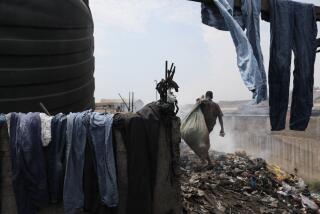Panel Supports 5-Year Curb on Shoe Imports
- Share via
In a move to protect U.S. shoemakers from a rising tide of imports, the International Trade Commission on Wednesday recommended a sweeping program of quotas to limit imports from all foreign countries over the next five years. If approved by President Reagan, the program will likely mean higher shoe prices for consumers.
The commission had been expected to make some recommendation this week after unanimously ruling last month that the domestic shoe industry had suffered serious economic injury because of cheap imports. The May 22 finding reversed a ruling by the commission a year ago that the shoe industry was not being hurt by imports.
In its recommendation Wednesday, approved by a 4-1 vote, the commission suggested a staggered quota system calling for footwear imports, excluding those made of rubber and those valued at $2.50 a pair or less, to be held at 474 million pairs during each of the first two years of the program.
In 1984, 725.9 million pairs were imported, or 71.5% of the total U.S. shoe market, according to Census Bureau data.
So far this year, imports have risen to 77.4% of the market and were up to 80% in March alone.
The quota limit would be allowed to rise by 3% in the third year, by 6% in the fourth year and by 9% in the fifth year. It would be retroactive to June 1.
The commission also recommended that the U.S. government sell import licenses for the proposed quota at a public auction “without discrimination as to country of origin,” which could eventually reduce the amount of cheap foreign shoes coming in.
The commission’s recommendations now go to President Reagan, who must decide whether to impose quotas by Sept. 1. It was unclear Wednesday what position the President may take.
In 1981, he lifted restrictions on shoe imports that had been imposed by former President Jimmy Carter. But Carter had limited his quotas only to shoes from Taiwan and South Korea, two big suppliers of cheap imports.
Reagan’s action four years ago drew criticism from members of Congress representing shoe-producing states as well as from the domestic shoe industry.
A year ago, U.S. shoemakers asked the ITC, the government body charged with determining whether imports are harming domestic industries, to investigate shoe imports.
At that time, the commission voted unanimously not to recommend any limits on imports.
But this year, after it was asked by the Senate Finance Committee to reopen its investigation, the ITC found “serious injury” to the domestic companies, which is required before the government may impose import restrictions.
Not Entirely Pleased
The proposed quota system was generally praised Wednesday by U.S. shoemakers. Fawn Evenson, vice president of national affairs for Footwear Industries of America, a trade group, said: “We are very pleased that we got a very strong recommendation for five years of global quotas. . . . It gives a good position to forward to the White House.”
She added, however, that the association was not entirely pleased and would press the White House to remove the ITC’s exemption for shoes valued at $2.50 or less, which accounted for 21% of total imports in 1984.
The association also is seeking to keep imports at no more than 55% of the U.S. market, she said, but the ITC’s recommendation of 474 million is equal to about 62% of 1984 sales.
At ITC hearings in April, industry leaders had testified that 105 U.S. shoe manufacturing plants were closed in 1983, resulting in the loss of 13,300 jobs.
Today, there are 275 manufacturers operating 500 factories, compared to 700 producers and 1,100 factories in 1968, when the U.S. government reduced tariffs on footwear by 50%, according to Evenson.
“That was the beginning of the flood,” she explained. Evenson added that an ITC study showed that profits of U.S. shoemakers fell 30% in 1984 from the year before.
Shoemakers have suffered in Los Angeles County, which is the second-largest shoe-producing county in the United States after Dade County, Fla.
Dick Sobel of the Los Angeles shoe firm of Sobel, Bernstein & Greene said: “I’m crossing my fingers that it (the quota) will pass, or there won’t be a shoe industry in the United States in the next five years. “
He said his firm, which produces women’s dress shoes here under the Amano and D’Antanio labels, has suffered a 40% drop in production over the last two years and a 25% cutback in employees because of imports.
Similarly, Seymour Fabrick, owner of Vogue Shoe in Los Angeles, said: “As chairman of the Southern California Shoe Manufacturers Assn., or what is left of it, I’ve been fighting against the inroads of imports for 30 years. I’m very pleased that the (ITC) saw fit to grant this relief.”
At one time, there were 4,200 shoe workers in the city of Los Angeles, he said, but that number has now dwindled to 1,400.
Blow to Consumer
Meanwhile, Peter T. Mangione, president of Footwear Retailers of America in Washington, a trade group, said:
“We think it (the quota) is a blow to the consumer since it will result, if implemented by the President, in consumers having to pay billions in higher shoe prices and enduring a drastic reduction in the availability of, particularly, low-priced shoes.”
Mangione said shoes that retail for $15 or less will be the hardest hit by the proposed import curbs. Shoes in that price range, he said, account for about half of the $20 billion in annual retail footwear sales.
The proposed auction system will boost prices for importers, which would be a disincentive to produce cheaper shoes, he said.
More to Read
Sign up for Essential California
The most important California stories and recommendations in your inbox every morning.
You may occasionally receive promotional content from the Los Angeles Times.










